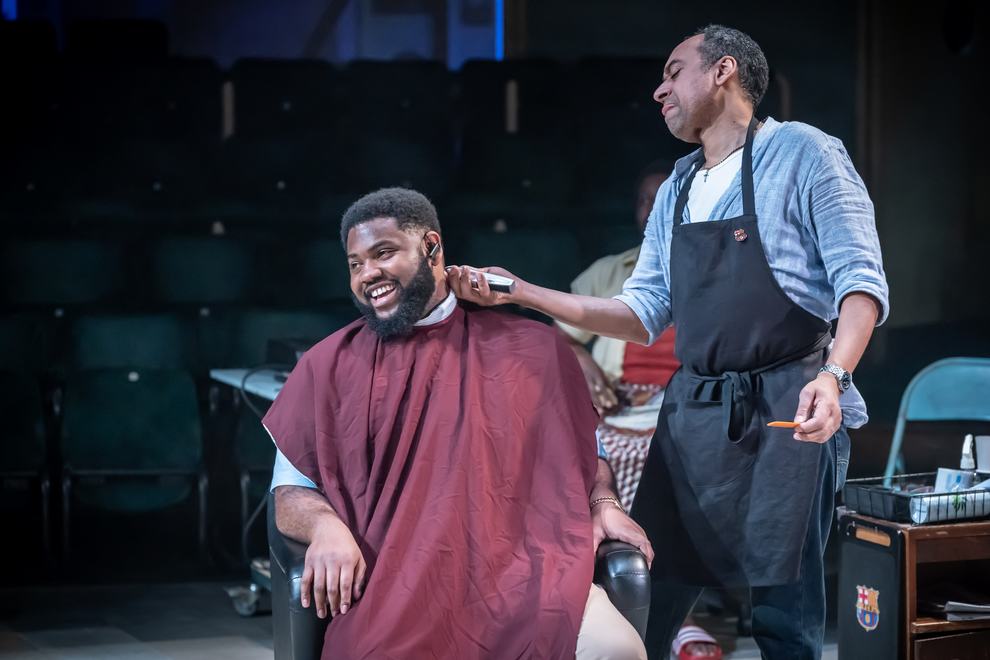
A Fuel, National Theatre and Leeds Playhouse co-production, Barber Shop Chronicles features twelve actors playing thirty characters, and is set in barber shops in Nigeria, Zimbabwe, South Africa, Ghana, Uganda…. and London. That’s ambitious, and there are times when this play bewilders, but more often it dazzles and delights.
The central idea is that barber shops are places where men open up to each other. There is the usual banter and shared enthusiasm for football, but they also talk of their personal experiences and their family relationships. There is conflict, and resolution; barber shop as confessional, and as therapy clinic. A giant, slowly spinning globe hangs over the stage, lighting up the six different countries in turn. At first, it seems that the only thing the customers have in common is a passionate interest in the outcome of a Chelsea v Barcelona game, but soon other themes emerge, tying the separate locations together like the fibre-optic threads that are draped overhead, linking barber shop signs from the different countries. Interconnectedness becomes a theme in itself.
The customers are a kaleidoscope mix of the young, the old, the passionate and the world-weary. Some are serious-minded and quietly reflective, but there are many flamboyant show-offs, too. There is a memorable sequence where one larger-than-life customer insists upon telling everyone about his two girlfriends, one black, the other white. His imitation of the white girl is very funny indeed, as is his mounting frustration when his tale is repeatedly interrupted. There are many light-hearted anecdotes such as this, and there’s a repeated ‘three men in a bar’ joke, but gradually more substantial topics come to the fore. A poster for a BMW sports car inspires one rather vain customer to have an ‘aerodynamic’ haircut, but later this poster will feature at the heart of a far more serious story. We learn of familial tensions and separations, tales of domestic violence, and disputes about national identities. There are absent fathers with feet of clay, skeletons in cupboards, and secrets that need to be revealed. Many of these weightier ideas are centred on the tale of a pugnacious young London barber whose father is in prison. He works in a barber shop run by his uncle, but their relationship is decidedly tense. Why did the uncle do so little to help his brother? It is their story that draws together many of the seemingly disparate elements in this play.
Writer Inua Ellams delights in provocation, and he takes some startling sideswipes at internationally admired icons. There is a character who feels deeply let down by Nelson Mandela, dismissing the work of the Truth and Reconciliation Commission as little more than a white men’s scam, and believing that Winnie Mandela would have been the better leader. Globally admired Nigerian musician Fela Kuti is thoroughly dissed, too. Elsewhere, there’s a thumbs-up for Robert Mugabe. There is a fierce debate about who should or should not use the n-word, and we learn that, for South African black men, ‘kaffir’ is even more offensive. In the Lagos setting there is a lesson on how important Nigerian pidgin is to national identity, not least because its origins lie not in the English language. This is fascinating, but there are times when Ellams becomes a little too pedagogic. He is at his best when his ideas are expressed in a less forced manner, through the lively, colloquial language of his characters. Ellams is a poet, and has the happy knack of finding the rhythms and images of poetry in demotic speech.
There are rapid scene changes, as the action shifts from one location to another. The actors wheel each other around on barbershop chairs, their cloths whirling like matadors’ capes, as they chant songs. The atmosphere is generally celebratory, noisy, uplifting, but there is also an underlying sense of uneasiness, of a struggle to find an identity that fits. Many of these men are ‘out of sync with the world’ and even ‘out of sync with themselves’. There is the assertion that barbershops are where ‘men come to be men’, but perhaps they also act as safe spaces in which to give voice to doubts and insecurities. Just what is it to be a ‘strong black male’? Barber Shop Chronicles examines this key question in an extraordinarily lively and inventive fashion. All the different interconnecting stories are not always easy to follow, but this is a play that merits close attention. This is ensemble theatre at its best, and the Old Vic has surely seen nothing quite like it before. If you find yourself with an on-stage ticket, you might even be given an impromptu ‘haircut’ before the action proper gets underway! Superbly directed by Bijan Sheibani, Barber Shop Chronicles is a two-hour show with no interval, but the time whizzes by as fast as that BMW sports car. On until May 18th, and not to be missed. ★★★★☆ Mike Whitton at Bristol Old Vic on 3rd May 2019

